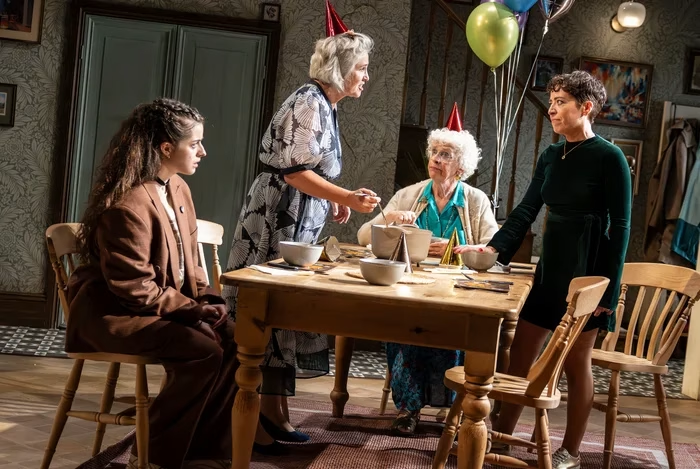Karis Kelly’s gripping drama, Consumed, which won the Women’s Prize for Playwriting in 2022, showcases the complexities of family relationships during a reunion dinner in Northern Ireland. This intense gathering features only the women of the family, setting the stage for an explosive confrontation that defies clichés. Kelly masterfully balances dark humor and emotional depth.
At the center of the action is Eileen (Julia Dearden), a sharp-tongued matriarch celebrating her 90th birthday. Her daughter, Gilly (Andrea Irvine), has a strained relationship with her own daughter, Jenny (Caoimhe Farren), who long ago ventured to London. The youngest, Muireann (Muireann Ní Fhaogáin), is Jenny’s daughter, raised far from her Northern roots.
Directed with flair by Katie Posner, the play is engagingly dark, drawing comparisons to works like Beth Steel’s Till the Stars Come Down and Martin McDonagh’s The Beauty Queen of Leenane. It explores the generational cycle of blame, as daughters confront the traumas they associate with their mothers, often overlooking the fathers’ roles.
Eileen initially comes off as a comically exaggerated figure, yet she cleverly conceals her vulnerabilities. Gilly exhibits sudden outbursts of rage that contrast with her otherwise composed demeanor. Jenny’s criticism of her mother reveals a poignant depth, brilliantly portrayed by Farren. Contrastingly, Muireann comes across as the most simplistic character, her tendency to discuss generational concerns like gluten and environmental issues lacking depth. Although she battles an eating disorder, this serious theme is only touched upon, overshadowed by the broader exchanges of trauma among the women.
The narrative transitions from realistic familial tensions to more abstract and symbolic reflections. Enhancements in Beth Duke’s sound design indicate this shift, hinting at deeper historical narratives intertwined with their personal struggles. While the start of the play incorporates discussions about Northern Ireland’s past, the focus gradually expands to encompass a wider history of collective conflict. This ambitious evolution is briefly explored, leaving several threads unresolved.
In just 70 minutes, Consumed presents a wealth of themes, suggesting that it could either grow into a fuller production or be streamlined further for brevity. Regardless, its promise is unmistakable.













